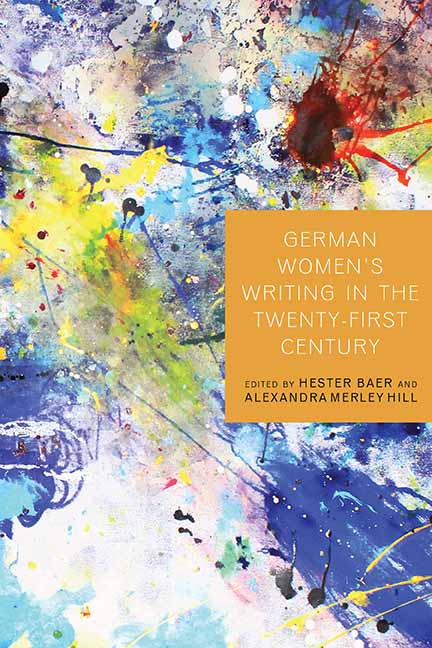Book contents
- Frontmatter
- Dedication
- Contents
- Acknowledgments
- Introduction: German Women’s Writing Beyond the Gender Binary
- 1 Language-Bodies: Interpellation and Gender Transition in Antje Rávic Strubel’s Kältere Schichten der Luft and Judith Hermann’s “Sonja”
- 2 Matrilineal Narrative and the Feminist Family Romance
- 3 The Pitfalls of Constructing a Female Genealogy: Cultural Memory of National Socialism in Recent Family Narratives
- 4 Reckoning with God: Attitudes toward Religion in German-Language Women’s Writing in the Twenty-First Century
- 5 Muslim Writing, Women’s Writing
- 6 Popfeminism, Ethnicity, and Race in Contemporary Germany: Hatice Akyün’s Popfeminist Autobiographic Works Einmal Hans mit scharfer Soße (2005) and Ali zum Dessert (2008)
- 7 The Awkward Politics of Popfeminist Literary Events: Helene Hegemann, Charlotte Roche, and Lady Bitch Ray
- 8 The Indictment of Neoliberalism and Communism in the Novels of Katharina Hacker, Nikola Richter, Judith Schalansky, and Julia Schoch
- 9 Sounds of Silence: Rape and Representation in Juli Zeh’s Bosnian Travelogue
- Bibliography
- Notes on the Contributors
- Index
7 - The Awkward Politics of Popfeminist Literary Events: Helene Hegemann, Charlotte Roche, and Lady Bitch Ray
Published online by Cambridge University Press: 25 May 2021
- Frontmatter
- Dedication
- Contents
- Acknowledgments
- Introduction: German Women’s Writing Beyond the Gender Binary
- 1 Language-Bodies: Interpellation and Gender Transition in Antje Rávic Strubel’s Kältere Schichten der Luft and Judith Hermann’s “Sonja”
- 2 Matrilineal Narrative and the Feminist Family Romance
- 3 The Pitfalls of Constructing a Female Genealogy: Cultural Memory of National Socialism in Recent Family Narratives
- 4 Reckoning with God: Attitudes toward Religion in German-Language Women’s Writing in the Twenty-First Century
- 5 Muslim Writing, Women’s Writing
- 6 Popfeminism, Ethnicity, and Race in Contemporary Germany: Hatice Akyün’s Popfeminist Autobiographic Works Einmal Hans mit scharfer Soße (2005) and Ali zum Dessert (2008)
- 7 The Awkward Politics of Popfeminist Literary Events: Helene Hegemann, Charlotte Roche, and Lady Bitch Ray
- 8 The Indictment of Neoliberalism and Communism in the Novels of Katharina Hacker, Nikola Richter, Judith Schalansky, and Julia Schoch
- 9 Sounds of Silence: Rape and Representation in Juli Zeh’s Bosnian Travelogue
- Bibliography
- Notes on the Contributors
- Index
Summary
SINCE THE MID-2000S there has been a marked uptick across the Western world of discussions surrounding the validity and effectiveness of feminism today. Terms such as “postfeminism” or “lifestyle feminism” are increasingly used to characterize a popular interest in making feminism palatable through depoliticization, even as political actions are publicly evaluated as successes or failures on the basis of criteria more appropriate for their second-wave forebears. These discussions either brand feminist cultural production as successful activism against a sexist, mainstream, and consumerist culture, or condemn it as mere media sensation that points to the failure or ineffectuality of feminism today. This production of unclear political meaning speaks to the current situation of contemporary feminisms in both popular and academic discourse.
The label of women's writing used in this volume is particularly illustrative of the pitfalls of such desire for clear evaluation, for it suggests that a neat categorization along easily delineated gender lines corresponds productively with literary work geared toward consumption by a specific, self-identified female audience. The term “Popfeminismus” (popfeminism), which emerged in Germany alongside these other terms to reference a feminism entangled in popular culture, offers one way of undoing the categorical delineation. Popfeminism uses feminism to draw from, disturb, and rewrite popular culture, but also uses popular culture to draw from, disturb, and rewrite feminism. The circular result contains an inherent awkwardness that we suggest is politically legible.
In this essay, we explore how that awkwardness is a useful concept for the production, consumption, and analysis of a branch of contemporary “women's writing” that understands itself or is received as both feminist and popular, because it offers a way out of the failure/success binary. In so doing, it problematizes the existence of the category of women's writing altogether, even while it confirms that in feminist literature, beginning a discussion with a notion of women's writing is potentially necessary. Awkwardness embraces the ambivalence of effectiveness in feminist creative work today that refuses clear meaning-making by nevertheless showing how its own position is intentionally (if ambivalently) political.
We use a popfeminist methodology to propose awkwardness as a theoretical tool for political interpretation.
- Type
- Chapter
- Information
- German Women's Writing in the Twenty-First Century , pp. 132 - 153Publisher: Boydell & BrewerPrint publication year: 2015
- 3
- Cited by

